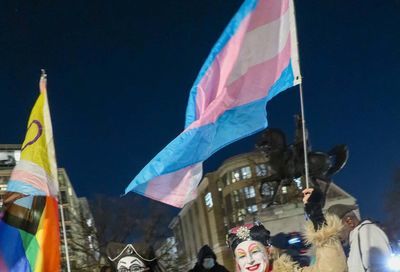Tennessee Bans Drag
Governor Lee signs bill banning drag shows on public property, and another measure barring trans youth from accessing gender-affirming care.
By John Riley on March 3, 2023 @JRileyMW

Tennessee Republican Gov. Bill Lee signed a pair of bills on Thursday targeting the LGBTQ community and expressions or displays of gender-nonconformity.
The first bill bans drag performances on public property and in places where they might be viewed by minors.
The bill defines drag performances as “adult cabaret performances,” likening them to sexually explicit shows like those featuring topless dancers, go-go dancers, exotic dancers, and strippers, or that contain material that “appeals to a prurient interest.”
Shows or venues hosting shows that violate the law can be prosecuted as a Class A misdemeanor, which is typically punished by a fine and up to a year in prison, with subsequent violations being prosecuted as a Class E felony, punishable by a fine and a prison sentence of one to six years.
When asked by reporters last month about the bill, Lee referred to drag shows as “sexualized entertainment in front of children,” reported The Associated Press.
At the same time, a photograph of the governor wearing a dress, published in his 1977 high school yearbook, surfaced on Reddit.
Lee scoffed at the notion that his donning drag was in any way comparable to the types of acts that he purports regularly occur in drag performances.
Similar bills are being considered in other states as the Republican Party nationwide has embraced anti-transgender and anti-drag legislation, playing on voters’ discomfort with gender-nonconformity by claiming that children are being “groomed” or exposed to “sexual” content when they view drag performances.
Many critics of drag often cite the dance movements that can occur in such shows — including splits, gymnastic-like tumbles, or “twerking” or “grinding” — claiming such movements are inappropriate for minors to view because they simulate sexual acts.
Opponents of the law argue that not all drag performances are inherently sexual, and that Tennessee — and other states that have taken similar actions to punish venues for hosting drag shows — are unfairly classifying drag as something that can only be carried out in specially-zoned or -licensed “adult-oriented” venues.
Additionally, other LGBTQ advocates warn that the law could be used to prosecute any transgender adult who simply wears gender-affirming clothing in public or presents themselves as a gender not matching their assigned sex at birth.
Overzealous police officers and prosecutors, they argue, will aggressively pursue any public expression of gender-nonconformity — even something as simple as painting one’s nails — as an “adult cabaret performance” in an attempt to discourage transgender visibility.
The American Civil Liberties Union claims that the bill’s wording, referring to performances that are “harmful to minors” is narrow and covers only content that has no artistic value, arguing that most drag shows are protected by the first amendment.
“The law bans obscene performances, and drag performances are not inherently obscene,” Stella Yarbrough, the legal director of the ACLU of Tennessee, told The New York Times.
Yarbrough added that the ACLU of Tennessee is concerned that elected officials may try to abuse the new law to censor people’s freedom of speech and freedom of expression, promising that the ACLU would challenge any attempt to use the law to punish drag performers or shut down family-friendly events.
Lee also signed a bill, taking effect on July 1, that stops health care providers from prescribing puberty blockers and hormones to trans-identifying minors, or from performing gender-affirming surgeries on people under 18.
With Lee’s signature, the Volunteer State becomes the eighth state in the nation to place some form of restriction on gender-affirming health treatments, following a similar bill that was signed in effect by Mississippi Gov. Tate Reeves earlier this week.
The ACLU, the ACLU of Tennessee, and Lambda Legal have said they intend to challenge the constitutionality of the law in court. Similar across-the-board bans in Alabama and Arkansas, which passed last year, have been blocked by the courts while lawsuits challenging the laws move forward.
“We will not allow this dangerous law to stand,” the legal groups said in a joint statement. “Certain politicians and Gov. Lee have made no secret of their intent to discriminate against youth who are transgender or their willful ignorance about the life-saving health care they seek to ban. Instead, they’ve chosen fear-mongering, misrepresentations, intimidation, and extremist politics over the rights of families and the lives of transgender youth in Tennessee.”
Republicans have seized on access to gender-affirming care as a wedge issue they can exploit, arguing that medical professionals are pressuring youth experiencing gender dysphoria into transitioning before they are old enough, later leading to “remorse” or “regret” when such individuals pursue life-altering treatments that do not resolve their feelings of depression, anxiety, or isolation.
But many major medical organizations argue that such treatments are helpful in alleviating gender dysphoria and the depression and suicidal ideation that stem from it, and oppose government interference in private medical decisions made between a patient, their parents, and their doctors.
“The passage of this law cutting off trans young people’s access to life-saving care is devastating — but it won’t stop our community from holding and supporting each other,” Ivy Hill, the director of Gender Justice for the Campaign for Southern Equality, said in a statement. “No law can stop the transgender community from charting our paths to thriving and living authentically.”
Phil Cobucci, the founder of Inclusion Tennessee, called both the drag ban and the ban on gender-affirming care “aggressive attacks on best-practice medical care and free speech.”
He said Lee’s signature of the law amounts to “state-sponsored violence.”
“The government has no place inserting itself into the private medical decisions that should be made by doctors, patients, and their families alone — and the restrictions on drag could easily be wielded as a weapon against artists and the trans community more broadly,” Cobucci said in a statement. “We will never stop working to support transgender Tennesseans and are sending our love, support, and strength far and wide.”
Georgetown Law Defies Federal Demand to Eliminate DEI
The dean of Georgetown Law School is pushing back against demands by D.C.'s U.S. Attorney to drop DEI programs and curriculum content.
By John Riley on March 18, 2025 @JRileyMW
The Trump administration continues to push the boundaries of free speech by threatening retaliation against Georgetown Law School if it fails to eliminate any diversity, equity, and inclusion (DEI) programs.
In a "letter of inquiry" dated February 17 but emailed to Dean William Treanor on March 3, Acting U.S. Attorney for the District of Columbia Ed Martin said that a whistleblower informed him that Georgetown Law School "continues to promote and teach DEI," calling such actions "unacceptable," according to The Associated Press.
Martin warned Treanor that his office wouldn't consider any Georgetown Law students for jobs, summer internships, or fellowships until the school dropped its DEI programs.
Transgender Blackhawk Pilot Sues Right-Wing Influencer
Virginia Army National Guard pilot Jo Ellis is suing Matthew Wallace for spreading misinformation about her for "clicks and money."
By John Riley on April 13, 2025 @JRileyMW
Jo Ellis, a transgender pilot in the Virginia Army National Guard, is suing a right-wing influencer Matthew Wallace for claiming she was flying the Black Hawk helicopter that collided with an American Airlines plane, causing a fatal crash that claimed the lives of all 67 people inside both aircraft.
Ellis claims Wallace, who has 2.3 million followers on X, exploited the January 29 tragedy for "clicks and money" and accuses Wallace of deliberately spreading information he knew to be false.
The lawsuit was filed in U.S. District Court for the District of Colorado.
A Second Judge Blocks Trump’s Anti-Trans Health Care Orders
A Maryland judge finds that transgender plaintiffs and their families are likely to succeed in proving the orders are unconstitutional.
By John Riley on March 5, 2025 @JRileyMW
A federal judge issued a nationwide order blocking a pair of executive orders from President Donald Trump seeking to criminalize the provision of gender-affirming health care to transgender youth.
U.S. District Judge Brendan Hurson, of the District of Maryland, granted a preliminary injunction to the families of several transgender young adults and adolescents whose access to gender-affirming care was disrupted by Trump's orders. Those families are joined by the pro-LGBTQ advocacy group PFLAG National and GLMA, the country's largest organization of LGBTQ and allied health professionals.
Support Metro Weekly’s Journalism
These are challenging times for news organizations. And yet it’s crucial we stay active and provide vital resources and information to both our local readers and the world. So won’t you please take a moment and consider supporting Metro Weekly with a membership? For as little as $5 a month, you can help ensure Metro Weekly magazine and MetroWeekly.com remain free, viable resources as we provide the best, most diverse, culturally-resonant LGBTQ coverage in both the D.C. region and around the world. Memberships come with exclusive perks and discounts, your own personal digital delivery of each week’s magazine (and an archive), access to our Member's Lounge when it launches this fall, and exclusive members-only items like Metro Weekly Membership Mugs and Tote Bags! Check out all our membership levels here and please join us today!
The Magazine
-
Most Popular
 Charges Dropped in Nancy Mace Assault Case
Charges Dropped in Nancy Mace Assault Case  Gay Army Reserve Officer in Uniform Sex Video Scandal
Gay Army Reserve Officer in Uniform Sex Video Scandal  Jared Polis Signs Law Repealing Colorado's Gay Marriage Ban
Jared Polis Signs Law Repealing Colorado's Gay Marriage Ban  WorldPride Warns International Trans Visitors About Travel Risks
WorldPride Warns International Trans Visitors About Travel Risks  Awesome Con Gallery: Rage Gear Studios
Awesome Con Gallery: Rage Gear Studios  'Porn Star University' Started by Gay-for-Pay Creator Andy Lee
'Porn Star University' Started by Gay-for-Pay Creator Andy Lee  Hugh Bonneville Delivers a Show-Stopping Vanya
Hugh Bonneville Delivers a Show-Stopping Vanya  Transgender Blackhawk Pilot Sues Right-Wing Influencer
Transgender Blackhawk Pilot Sues Right-Wing Influencer  White House Demands NIH Study Transgender Transition "Regret"
White House Demands NIH Study Transgender Transition "Regret"  Air Force Reverses Ban on Pronouns in Email Signatures
Air Force Reverses Ban on Pronouns in Email Signatures
 Jared Polis Signs Law Repealing Colorado's Gay Marriage Ban
Jared Polis Signs Law Repealing Colorado's Gay Marriage Ban  White House Ignores Reporters with Pronouns in Email Signatures
White House Ignores Reporters with Pronouns in Email Signatures  White House Demands NIH Study Transgender Transition "Regret"
White House Demands NIH Study Transgender Transition "Regret"  Air Force Reverses Ban on Pronouns in Email Signatures
Air Force Reverses Ban on Pronouns in Email Signatures  Transgender Blackhawk Pilot Sues Right-Wing Influencer
Transgender Blackhawk Pilot Sues Right-Wing Influencer  'cullud wattah' is a Compelling Drama About Flint's Toxic Water
'cullud wattah' is a Compelling Drama About Flint's Toxic Water  Gay French Thriller 'Misericordia' is Creepy and Suspenseful
Gay French Thriller 'Misericordia' is Creepy and Suspenseful  Hugh Bonneville Delivers a Show-Stopping Vanya
Hugh Bonneville Delivers a Show-Stopping Vanya  This Week's Advertisers: Rep. Becca Balint - April 10, 2025
This Week's Advertisers: Rep. Becca Balint - April 10, 2025  WorldPride Warns International Trans Visitors About Travel Risks
WorldPride Warns International Trans Visitors About Travel Risks
Scene
Metro Weekly
Washington's LGBTQ Magazine
P.O. Box 11559
Washington, DC 20008 (202) 638-6830
About Us pageFollow Us:
· Facebook
· Twitter
· Flipboard
· YouTube
· Instagram
· RSS News | RSS SceneArchives
Copyright ©2024 Jansi LLC.










You must be logged in to post a comment.